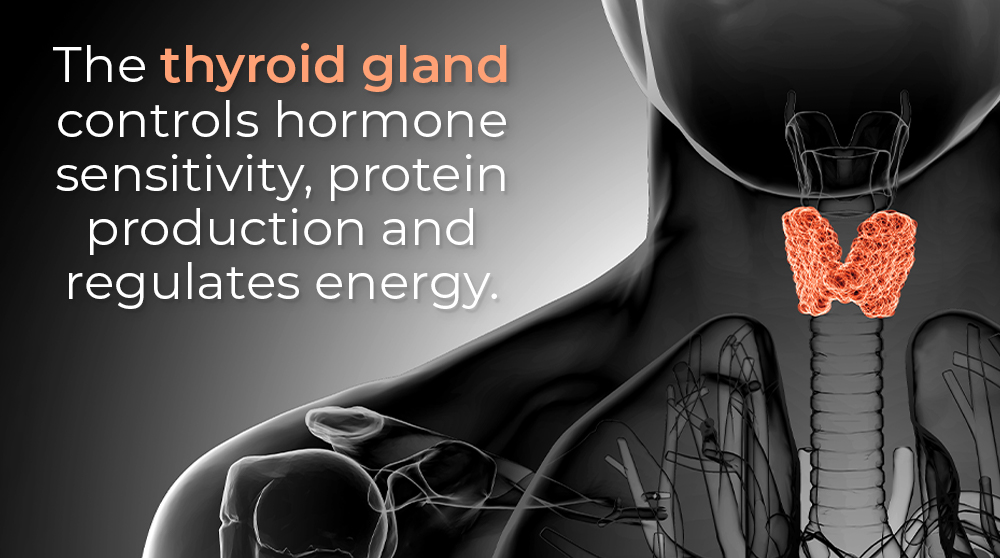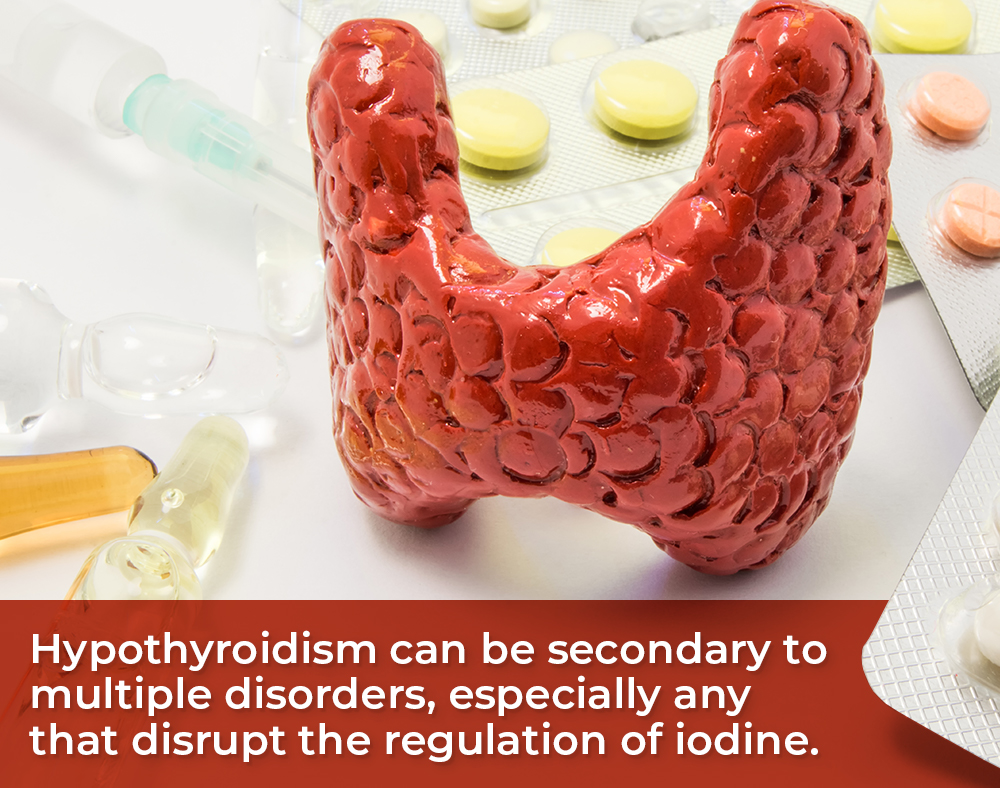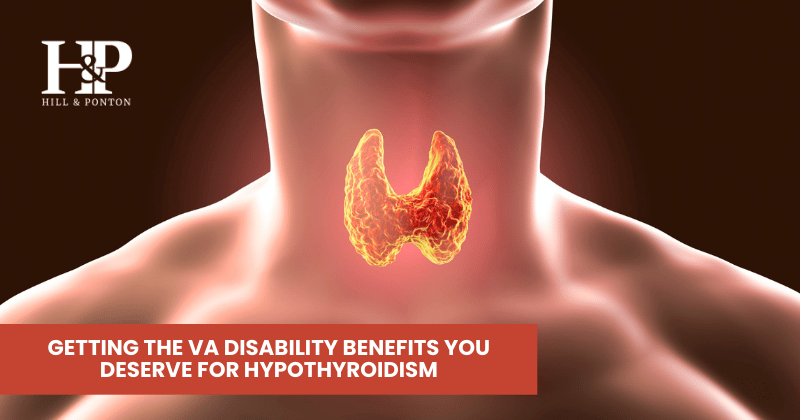The thyroid gland is a butterfly-shaped gland located in the front of the neck, just below the “Adam’s apple.”
It’s part of the endocrine system, produces thyroid hormones, controls how sensitive your body is to other hormones, regulates the production of proteins, and regulates how your body uses energy.
Thyroid disorders can affect your health in a number of ways.
Some veterans may be experiencing a type of thyroid dysfunction called hypothyroidism, which is often linked to chemical exposure or iodine deficiency. There is also increasing evidence that hypothyroidism is linked to Agent Orange exposure.
While it can be difficult to obtain service connection, veterans living with hypothyroidism may be eligible for benefits through the United States Department of Veterans Affairs.
Recently, there have been great news for Vietnam veterans suffering from hypothyroidism now that it’s been added to the Agent Orange presumptive list of conditions.

What Is Hypothyroidism?
Thyroid dysfunction comes in three “flavors:” hypothyroidism, hyperthyroidism, and thyroid cancer and they’re all bad.
Hypothyroidism can simply be thought of as “not enough thyroid,” or underactive thyroid causing low hormone levels, and can have severe repercussions on many different bodily functions, which can easily cause secondary health problems
For instance, one of the most well-known symptoms of hypothyroidism is obesity, which can cause a whole host of cardiovascular and even orthopedic problems.
Symptoms of hypothyroidism include:
- Fatigue
- Dry skin
- Muscle weakness
- Cold intolerance
- Constipation
- Joint pain and stiffness
- Weight gain
- Puffy face
- Hoarseness
- Heavy menstrual periods
- Thinning hair
- Depression
- Memory issues
- Increased cholesterol
- Slowed heart rate
- Thyroid enlargement
- Altered body temperature
- And more
Hyperthyroidism, also referred to as “Graves disease,” can be thought of as “too much thyroid” or an overactive thyroid.
While you can take synthetic thyroid substitutes to improve hypothyroidism, often the only medical treatment for hyperthyroidism is to flood the thyroid with radioactive iodine, which induces hypothyroidism.
Thyroid cancer can also lead to the removal of the thyroid, and will also lead to hypothyroidism. So, in the long run, most people with thyroid problems will develop hypothyroidism.
VA Ratings for Thyroid Conditions
Conditions of the thyroid are rated under 38 CFR §4.119.
DC 7900 Hyperthyroidism including Graves Disease
Hyperthyroidism, also known as overactive thyroid, is a condition where the thyroid gland will produce excessive amounts of thyroid hormones.
Symptoms of hyperthyroidism include:
- Fatigue
- Muscle weakness
- Heat intolerance
- Trouble sleeping
- Irregular heartbeat
- Weight loss
- Eye swelling
Once initially diagnosed, veterans are assigned a 30 percent disability rating for six months.
After, they are re-evaluated and rated based on continuing symptoms or any medical complications.
The VA uses diagnostic codes from affected parts of the body to rate complications or any remaining symptoms.
DC 7901 Toxic Thyroid Enlargement
Also known as goiter, this condition is when the thyroid gland becomes enlarged and produces too many hormones.
DC 7902 Nontoxic Thyroid Enlargement
Also an enlarged thyroid gland but doesn’t have an impact on hormone production.
DC 7903 Hypothyroidism
Underactive thyroid condition where the thyroid gland does not produce sufficient thyroid hormone. Symptoms include:
- Weight gain
- Cold intolerance
- Fatigue
- Dry skin
- Hair loss
- Constipation
- Heavy or irregular menstral cycles
- Depression
- Slowed heart rate
Myxedema is an advanced form of hypothyroidism and is life-threatening in some cases. If you are diagnosed with this condition, you will receive a 100 percent disability rating.
If you do not have myxedema, you are assigned a rating of 30 percent for six months.
DC 7906 Thyroiditis
Inflammation of the thyroid gland. It may not produce symptoms but can lead to hyper/hypothyroidism. If there are no symptoms, you will be assigned a rating of 0 percent.
DC 7914 Malignant Neoplasm of the endocrine system
Veterans with thyroid cancer automatically receive a 100 percent rating while the cancer is diagnosed.
Service Connection for Hypothyroidism
For years, many veterans had difficulty getting their thyroid-related disability service connected.
However, thanks to a recent update to the Agent Orange presumptive list of conditions, hypothyroidism is now presumed to be connected to Agent Orange exposure during the Vietnam War.
If VA denied your claim in the past for hypothyroidism, they will automatically review your case again so check your mail because they usually send a letter.
Additionally, there are many chemicals that can cause hypothyroidism, including:
- solvents (including TCE/trichloroethylene)
- radiation
- lead
- ammonium perchlorate (rocket/missile propellant)
- perfluoroalkyl acid (AFFF Foam)
- pesticides
- chlorine dioxide (water disinfectant)
- heavy metals
- benzopyrene (in JP-4 and other exhausts)
- dioxins (TCDD, in Agent Orange and burn pits)
- coal smoke
- wood preservatives (burn pits)
If you don’t find your decision favorable in regards to your hypothyroidism VA disability claim, you can initiate a decision review process within one year from the date indicated in the award letter. If you are considering filing for an appeal, our knowledgeable team at Hill & Ponton, P.A. would be happy to assist you with this process.
Hypothyroidism and Agent Orange
Vietnam War veterans who were exposed to Agent Orange during military service may have later developed serious health conditions.
The VA has a list of conditions that are presumed to be caused by Agent Orange.
If a Vietnam veteran meets certain eligibility requirements and has one of these conditions, they are automatically awarded service connection to receive VA disability benefits.
The newly updated list of presumptive diseases now includes:
- Hypothyroidism
- Bladder cancer
- Parkinsonism (different from Parkinson’s disease)
- Chronic B-cell leukemia
- Hodgkin’s disease
- Multiple myeloma
- Non-Hodgkin’s lymphoma
- Prostate cancer
- Respiratory cancers (including lung cancer)
- Some soft tissue sarcomas
- AL amyloidosis
- Chloracne
- Diabetes mellitus type 2
- Ischemic heart disease
- Parkinson’s disease
- Peripheral neuropathy (early onset)
- Porphyria cutanea tarda
VA recognizes hypothyroidism linked to Agent Orange
Hypothyroidism wasn’t among this list of conditions for decades, however, thanks to evidence demonstrating a link between hypothyroidism and Agent Orange, the VA has now amended and updated their Agent Orange presumptive list of conditions.
Now that it’s official, Vietnam veterans with hypothyroidism can obtain necessary service-connected compensation for their disability.
For decades, veterans groups advocated for this change and they’ve finally gotten it; we just hope it wasn’t too late.

Secondary Service Connection for Hypothyroidism
Hypothyroidism can be secondary to several different disorders, most notably any disorder that disrupts the regulation of iodine in the body and also pituitary gland problems.
Some medications such as lithium, amiodarone (Cordarone), and carbamazepine have been shown to induce thyroid problems.
Other classes of drugs that have been suspected of affecting thyroid disease are antidepressants, drugs used to treat multiple sclerosis, hepatitis, and some drugs used in chemotherapy.
Surprisingly, veterans with PTSD are up to EIGHT times more likely to suffer from thyroid dysfunction.
I’ve written before on how the immune system and the neurological system are inextricably linked, and immune problems that can be related to thyroid function, like Hashimoto’s Thyroiditis, or even Gulf War Syndrome, may all be different expressions of the same underlying immune problems or processes.
Have Questions About the Claims Process or Appealing a Decision?
The attorneys at Hill & Ponton are here to support you in your claim. If you are intending to appeal a denied claim, you can contact us for an evaluation.
We also offer a free ebook The Road to VA Compensation Benefits, to help break down the claims process from start to finish. Click the link below to learn more.






